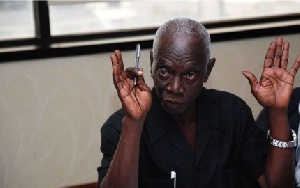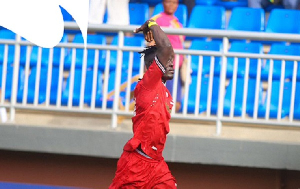Star witness for the second respondent in the ongoing presidential election petition has told petitioners to stop hounding him with questions on the registration process because he is not a registration officer.
Dr Kwadwo Afari-Gyan made the comment shortly after Philip Addison, Counsel for the petitioners had taken the stage to begin his cross-examination.
The EC chairman had lucidly testified on the entire election process, beginning with the registration exercise, to happenings on the day he declared President John Mahama as the winner of the 2012 general elections.
So thorough was his evidence that Addison accused him of “lecturing” instead of providing straight forward answers to questions asked him.
After his lecturing, Afari-Gyan was taken through brief moments of ‘friendly’ cross-examination by counsel for the first and third respondents, Tony Lithur and Tsatsu Tsikata, but Addison was not going to be friendly.
He was 'hostile' and that was to be expected. Addison asked the witness to confirm to the court if his famous declaration of John Mahama as the winner of the 2012 election was based on 26,002 polling stations.
Afari-Gyan said that was what he thought until his attention was drawn to the fact that certain areas had their results cancelled. He said he had no basis of knowing that some results had been cancelled.
On the issue of biometric verification, Dr Afari-Gyan minced no words in touting the positives of the use of the machines which he said was to prevent impersonation and double voting.
When asked if it was his understanding that some people voted without being verified, the chairman of the EC said certain human influences may have prevented people from strictly adhering to the principle of no verification, no vote.
He cited a scenario where presiding officers may allow paramount chiefs to vote without being verified because the chiefs may well be known to the presiding officers and agents.
Philip Addison then took the witness through the biometric registration process and sought clear, unambiguous answers from the witness on the processes involved in generating a biometric ID.
He started by asking the witness what form 1A is. After brief hesitations, Afari-Gyan said it was the form on which the particulars of prospective voters are recorded.
Click to view details



General News of Thursday, 6 June 2013
Source: joyonline
I am not a registration officer - Afari-Gyan
Opinions
















